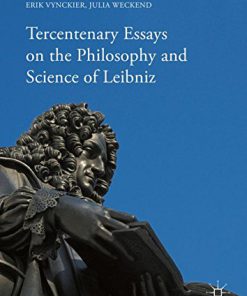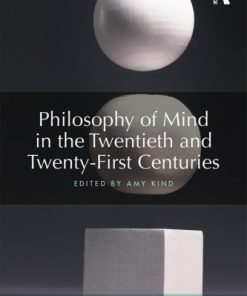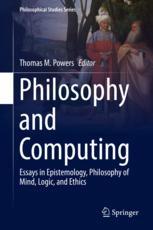Leibniz’s naturalized philosophy of mind 1st Edition by Larry Jorgensen, Gottfried Wilhelm Leibniz 0198714580 9780198714583
$50.00 Original price was: $50.00.$25.00Current price is: $25.00.
Leibniz’s naturalized philosophy of mind 1st Edition by Larry M. Jorgensen, Gottfried Wilhelm Leibniz – Ebook PDF Instant Download/DeliveryISBN: 0198714580, 9780198714583
Full download Leibniz’s naturalized philosophy of mind 1st Edition after payment.

Product details:
ISBN-10 : 0198714580
ISBN-13 : 9780198714583
Author: Larry M. Jorgensen, Gottfried Wilhelm Leibniz
Larry M. Jorgensen provides a systematic reappraisal of Leibniz’s philosophy of mind, revealing the full metaphysical background that allowed Leibniz to see farther than most of his contemporaries. In recent philosophy much effort has been put into discovering a naturalized theory of mind. Leibniz’s efforts to reach a similar goal three hundred years earlier offer a critical stance from which we can assess our own theories. But while the goals might be similar, the content of Leibniz’s theory significantly diverges from that of today’s thought. Perhaps surprisingly, Leibniz’s theological commitments yielded a thoroughgoing naturalizing methodology: the properties of an object are explicable in terms of the object’s nature. Larry M. Jorgensen shows how this methodology led Leibniz to a fully natural theory of mind.
Leibniz’s naturalized philosophy of mind 1st Table of contents:
PART I: Leibniz’s Naturalizing Project
1: Nature and Natures
1. Sophie’s Naturalism: “everything that happens is natural”
1.1. Naturalism of a sort
1.2. Limiting “nature”
2. Leibniz’s Middle Way
2.1. Three sects of naturalists
2.2. The threat of occasionalism
2.3. “Traces of God”: A representational theory of substance
3. A Harmony of Nature and Grace
3.1. Miracles
3.2. Nature and grace
4. Conclusion
2: Naturalizing Constraints: Equipollence and Continuity
1. The Rejection of Occasionalism, Part I
1.1. Early discontinuities (1676)
1.2. The rejection of occasionalism (1676–86)
1.3. Development of the principle of continuity
2. Formulations of the Principle of Continuity
3. The Methodological Utility of the Principle of Continuity
4. Conclusion
3: The Intelligibility of Nature
1. The Rejection of Occasionalism, Part II
2. An Occasionalist Reply
3. A Leibnizian Response: Laws and Natures
4. The PSR and the Principle of Intelligibility
4.1. The normative weight of the PSR
4.2. The PSR and naturalism
5. Leibniz’s Naturalism
5.1. Against naturalism
5.2. A Leibnizian naturalism
6. Conclusion
PART II: The Metaphysical Basis of Minds
4: Substance and Force
1. “All true predication has a basis in the nature of things”
2. Substance, Force, and Living Mirrors
3. Active and Passive Force
4. Conclusion
5: Living Mirrors: Expression and Perception
1. Substance, Force, and Perception
2. Leibniz’s Concept of Expression
3. Natural Expression, Causation, and Relations of Structure
4. Corporeal and Mental Expression
5. Conclusion
6: Perceptual Distinctness: and Mental Activity
1. Perceptual Distinctness
1.1. Varieties of distinctness
1.2. Degrees of distinct perceptions
1.3. Analyses of perceptual distinctness
2. Perceptual Distinctness and Bodily Mediation
2.1. Perceptual distinctness in activity and sensation
2.2. The bridge from activity to sensation
2.3. The force of reason
2.4. Degrees of perceptual distinctness
3. Expression and Bodily Mediation
4. Conclusion
PART III: Mind in the Natural Order
7: Perception, Consciousness, and Continuity
1. The Problem of Consciousness
2. Solution 1: Universal Consciousness
2.1. Furth: Perceptual distinctness as distribution of consciousness
2.2. De Gaudemar: Consciousness and unconsciousness as correlative notions
3. Solution 2: Higher-Order Theory of Consciousness
3.1. The textual case for HOT
3.2. HOT and the threat of discontinuity
3.3. Fixing up HOT
4. Solution 3: The Threshold View
4.1. Transformations and continuous transitions
4.2. The force of the principle of continuity
5. Conclusion
8: Looking Back: Memory and Consciousness
1. The Challenge
2. Leibniz’s Concept of Memory
2.1. Memory in all substances?
2.2. Memory restricted to rational substances
2.3. Memory restricted to souls and higher substances
2.4. Bringing the strands together
3. The Memory Theory
3.1. Memory and higher-order perception
3.1.1 Which Memory?
3.1.2 Objections and Replies
3.2. A memory theory, but not higher-order
4. Continuity and Immediate Memory
5. Memory and Perceptual Distinctness
6. Conclusion
9: Looking Forward: Appetite and Desire
1. A Naturalized Theory of Appetite
1.1. Naturalism and the dynamics of mind
1.2. Active and passive power
2. Causation and Teleology
3. Teleology, Action, and Passion
3.1. Response #1: Restricted teleology
3.2. Response #2: Natural teleology
3.3. Response #3: Distinguishing types of teleology
3.4. Essences and natures
4. Appetite and Continuity
PART IV: The Prerogative of Minds
10: Rational Beings and Animal Souls
1. Mind the Gap: Evidence of the Gappiness of Leibniz’s Theory of Reason
2. Bridging the Gap, Stage 1: Generation and the Transcreation of Rational Beings
2.1. Generation and transcreation
2.2. Systematic considerations against transcreation
2.2.1 Indirect argument from criticisms of occasionalism
2.2.2 Reasins and natures in leibniz’s philosophy
2.3. Reconciling the texts
3. Bridging the Gap, Stage 2: The Chain of Being and the Privilege of Minds
4. Conclusion
11: Moral Identity and the Appearance of the Self
1. Moral Identity
2. Moral Identity: Appearance and Reality
3. The Appearance of Moral Identity: Content
12: Self-Reflection, Perception, and Conceptual Thought
1. Perception and Conceptual Thought
1.1. Ideas
1.2. Self-Consciousness, perception, and conceptual thought
1.3. The two-fold representation of the self
2. Instinct and Reason
2.1. The two processes
2.2. How are ideas or moral actions related to the content of sensation?
2.3. Are the principles themselves truths of reason?
2.4. How are ideas and actions themselves related to reason?
3. Continuity Redux
Conclusion: Nature and Grace: Striking a Leibnizian Harmony
1. The Project of Naturalism
2. Naturalism and Physicalism
3. Naturalism and Religion
4. Conclusion
People also search for Leibniz’s naturalized philosophy of mind 1st:
leibniz philosophy of mind
leibniz philosophy
leibniz philosophy summary
leibniz’s naturalized philosophy of mind
philosophy of leibniz
Tags: Leibnizs naturalized, philosophy, Larry Jorgensen, Gottfried Wilhelm Leibniz
You may also like…
Politics & Philosophy - Anthropology
Tercentenary Essays on the Philosophy and Science of Leibniz 1st Edition Lloyd Strickland
Politics & Philosophy - Anthropology
Kant and the philosophy of mind : perception, reason, and the self 1st Edition Gomes
Politics & Philosophy - Anthropology
History - World History
Leibniz : protestant theologian 1st Edition Backus 9780199891849, 0199891842
Politics & Philosophy - General & Miscellaneous Philosophy
Politics & Philosophy
Tercentenary Essays on the Philosophy and Science of Leibniz 1st Edition Lloyd Strickland
Uncategorized
Politics & Philosophy - Philosophical Positions & Movements












